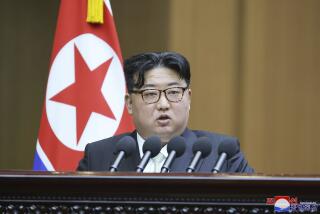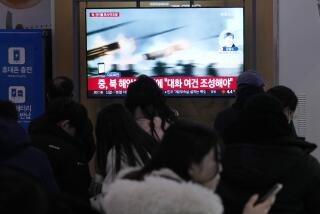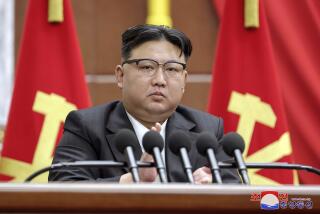N. Korea, facing new sanctions, threatens to cancel 1953 armistice
With the United States pushing for tougher sanctions on North Korea in the wake of its latest nuclear test, the North threatened Tuesday to cancel the 1953 armistice that halted the Korean War.
The North Korean military said in a statement released on state media that military drills staged by the U.S. and South Korea “are a vivid expression of their systematic violation” of the 60-year-old agreement and that Pyongyang would therefore invalidate the armistice.
The military also said it would block a hot line between North and South Korea and vowed to counter its enemies with nuclear strikes. The North “will make a strike of justice at any target any time as it pleases without limit,” the statement said.
Analysts in the U.S. cautioned against overreacting to threats, noting that North Korean officials have frequently lashed out with belligerent talk in state media, usually in reaction to new pressure abroad or military drills in the region.
The two Koreas are technically still at war because the conflict decades ago ended with an armistice rather than a peace treaty.
“What they’re saying is, ‘We’re still at war, let us remind you,’ ” said Jae H. Ku, director of the U.S.-Korea Institute at the Johns Hopkins School of Advanced International Studies. “There is no avenue toward a peace treaty if there is no armistice.”
Ku believes the statement was specifically aimed at China, which has reportedly joined the U.S. in backing a newly proposed U.N. Security Council resolution targeting North Korea and its nuclear ambitions with tougher sanctions. Beijing, long an ally of Pyongyang, appears increasingly frustrated by North Korea’s provocative moves on the world stage.
Susan Rice, U.S. ambassador to the United Nations, told reporters Tuesday that “the breadth and scope of these sanctions is exceptional,” targeting illicit activities of North Korean diplomats as well as illicit banking relationships and cash transfers, Associated Press reported. The Security Council is expected to vote on the new sanctions this week.
Though the harsh words from North Korea were ostensibly a reaction to the ongoing military drills, “they’ve never jumped so high about them before. … The sanctions seem to be the trigger,” said Leon V. Sigal, director of the Northeast Asia Cooperative Security Project at the Social Science Research Council.
Sigal added that warring rhetoric in the Koreas, though not unprecedented, runs the risk of escalating into real clashes, such as the bloodshed over the South Korean island of Yeonpyeong less than two and a half years ago. That risk could increase if North Korea does cut off the hot line, he said.
“Hotlines are ideally used to say, ‘We didn’t mean that,’ or ‘That was an accident,’ and that’s important when you have a tense moment,” Sigal said. “It’s pulling the plug on a way to avoid a clash.”
Still, “as annoying as the hyperbole is, it is a rather mild response given the range of ways that North Koreans could possibly express displeasure,” said Daryl Kimball, executive director of the Washington-based Arms Control Assn. “It’s not helpful – but it’s not a severe step.”
ALSO:
Fierce fighting reported in Syrian city of Raqqah
Malaysian forces pound Filipino gunmen on Borneo
Russian police detain suspect in Bolshoi acid attack
More to Read
Start your day right
Sign up for Essential California for news, features and recommendations from the L.A. Times and beyond in your inbox six days a week.
You may occasionally receive promotional content from the Los Angeles Times.






